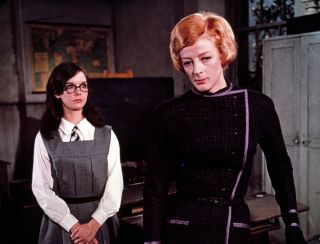Intelligence
Bad Teachers Can Damage You-- or Make You Stronger
Working hard to make sure I knew the answers, I became effective and defiant.
Posted September 27, 2015

I had two rotten teachers during my school years. You can learn a great deal from those who don’t have your best interests at heart.
It’s smart to pay attention to the opposition. It’s often your enemies and not your allies who teach you how to fight most efficiently and stand up for yourself.
The first teacher categorized me as a version of the demon child from “The Bad Seed.” I’d been “skipped” from second to fourth grade but felt so out of place after two weeks with kids so much bigger than me that they seemed to cast looming shadows, with my parents’ approval I asked to be returned to my peers in a third-grade class.
No big deal, right?
Except the teacher refused to recognize me as part of the group.
I was a cuckoo in the nest. If I raised my hand, she’d say, “I’d like one of my own students to answer this, Gina.” If I did well on an assignment, she’d only write “Correct” when she wrote “Good Job!” on the tops of papers from other kids who did less well. When I asked her in tears, one day after school, what I could do better, she told me to stop “acting like Sarah Bernhardt.”
I was eight years old and had no idea what she was talking about. Neither did my parents. We had to go to the public library to look it up. Neither of my parents had graduated from high school, meaning they were too intimidated by teachers to defend me against the insult, and so I just went back to class.
Yet something changed. I knew for certain that I could do nothing to make the teacher like me and I stopped trying to get her affection. But I didn’t stop trying to get her attention.
I didn’t stop raising my hand when I knew the answer and I worked hard to make sure I knew a lot of them. I became effective and defiant without being impolite.
That’s served me well.
The second teacher, this time in high school, was a version of Muriel Spark’s charming character Miss Jean Brodie. Around her formed a small coterie of admiring girls, of which I was one.
In contrast to my earlier experience, I was now part of the inner circle. We’d sit in a circle after school and read poems. We’d listen, enthralled, to stories about boys who had loved her during college and whose hearts she’d broken to marry the love of her life. She wrote us notes during school breaks to tell us we were in her thoughts.
Over one of those breaks, my mother was diagnosed with bone cancer and given a few months to live. When I went to tell the teacher, she explained to me in a gentle voice that I shouldn’t expect the little group of students to shoulder such a burden. She said it would perhaps be better if I spent less time in her presence.
From that one very bad teacher, I learned that intelligence without emotional generosity means nothing, that narcissism unchecked is poisonous and that sometimes it is far more honorable to be refused membership to a group than to be part of it.
That lesson left welts.
From my best teachers — and there were far many more of those — I learned that patience, creativity and being able to see an individual’s talents can provide even the most vulnerable child a sense of wild possibilities. I had wise teachers who made school the safest place in the world.
There were teachers who let me cry on their shoulders while relentlessly insisting I do better work. The best taught me wonderfully. The worst taught me much.
---
An earlier version of this essay was published by the Hartford Courant & The Tribune Co.


